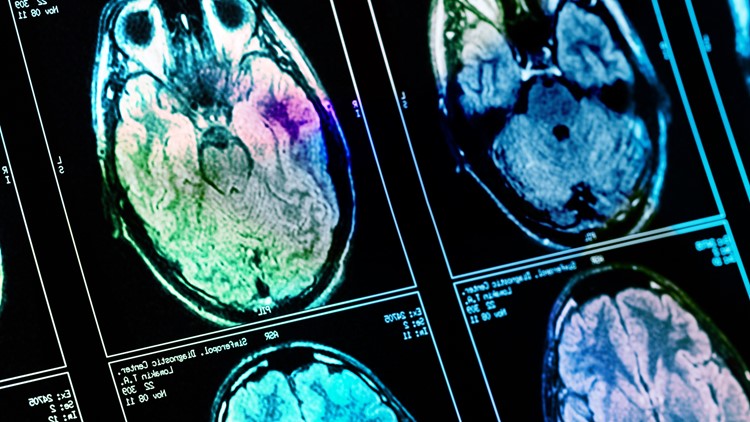TAMPA, Fla. — Editor's note: The brain scan depicted above is not the one studied by scientists.
After recording the final moments of a dying person's brain, scientists suggest people could experience a "last recall" of their lives.
The new study was published in Frontiers in Aging Neuroscience. It suggests your brain could remain active and be coordinated during and even after transitioning to death.
The brain could even "orchestrate" your whole life, putting stock into the saying "life flashes before your eyes."
Technology Networks explains it could be similar to a "life recall," which is akin to a near-death experience.
The potential breakthrough brain scan came from an 87-year-old person who had fallen and was admitted to the hospital. While getting treatment, their condition worsened and doctors found the patient had bilateral acute subdural hematomas, the study said.
After an operation to "evacuate" the hematoma, the patient appeared to get better, but soon deteriorated and began having seizures, according to the study.
In an effort to detect the seizures and treat the patient, doctors used continuous electroencephalography (EEG). During the recordings, the person had a heart attack and passed away, Technolgy Networks says.
The patient's death resulted in the first-ever brain scan of a dying person.
“We measured 900 seconds of brain activity around the time of death and set a specific focus to investigate what happened in the 30 seconds before and after the heart stopped beating,” Dr. Ajmal Zemmar, a neurosurgeon at the University of Louisville who organized the study, told Technolgy Networks.
“Just before and after the heart stopped working, we saw changes in a specific band of neural oscillations, so-called gamma oscillations, but also in others such as delta, theta, alpha, and beta oscillations.”
The oscillations, known as "brain waves," are "patterns of rhythmic brain activity" present in humans.
The types of brain waves indicate high-cognitive functions, such as dreaming, meditation, information processing and concentrating, Technology Networks says.
The same oscillations are associated with memory flashbacks, ZME Science says. The brain waves could also explain anecdotal reports about near-death experiences.
The Horizon Research Foundation suggests about a third of people who have come close to death say they've experienced a near-death experience.
The gamma oscillations have been observed in studies involving rats, according to the study.
Researchers note this study is solely based on one person's brain scan, and the patient had been injured prior to the scans and their death. This complicates the interpretation of the data gathered.
However, the study also notes that not only is the gathered data consistent with research performed with animals, but it's "impossible" to get near-death data from "healthy" people.
"We do not anticipate death in healthy subjects and therefore could not obtain uninterrupted recordings in the near-death phase in anything other than from circumstances involving pathological conditions in acute care hospital settings," the study's researchers said.
Zemmar told Technology Networks he plans to investigate more cases and sees these results as a source of hope.
“Something we may learn from this research is: although our loved ones have their eyes closed and are ready to leave us to rest, their brains may be replaying some of the nicest moments they experienced in their lives,” he said.
You can read more about the study here.



